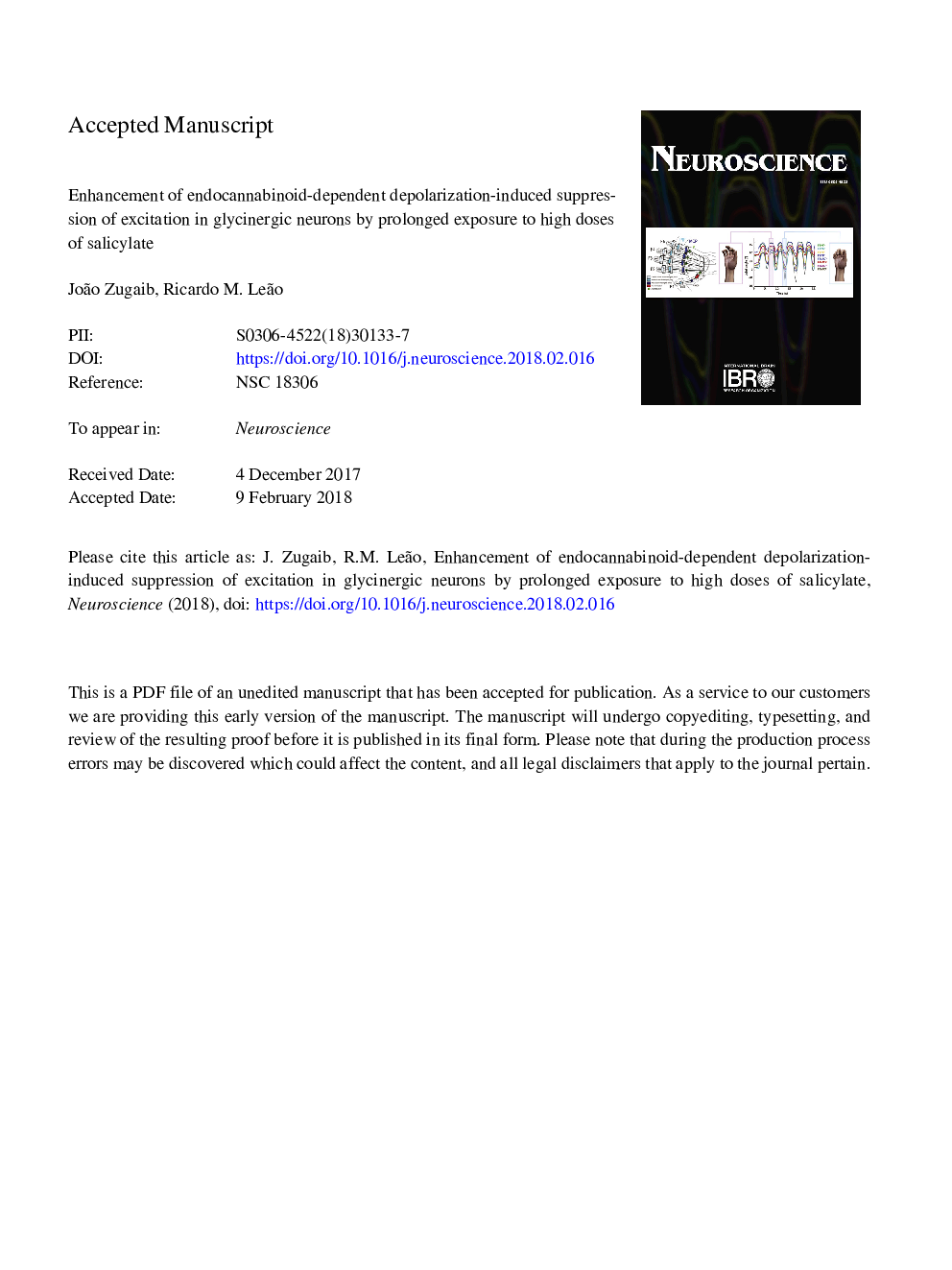| کد مقاله | کد نشریه | سال انتشار | مقاله انگلیسی | نسخه تمام متن |
|---|---|---|---|---|
| 8840861 | 1614700 | 2018 | 29 صفحه PDF | دانلود رایگان |
عنوان انگلیسی مقاله ISI
Enhancement of Endocannabinoid-dependent Depolarization-induced Suppression of Excitation in Glycinergic Neurons by Prolonged Exposure to High Doses of Salicylate
ترجمه فارسی عنوان
تقویت مهار هیجان انگیز وابسته به اندوکانیبینیدها در نورون های گلیسینرژیک با قرار گرفتن در معرض طولانی مدت با دوزهای بالا سالیسیلات
دانلود مقاله + سفارش ترجمه
دانلود مقاله ISI انگلیسی
رایگان برای ایرانیان
کلمات کلیدی
HEPESEGTACartwheel cellDSEIPSCDCN4-(2-hydroxyethyl)-1-piperazineethanesulfonic acid - 4- (2-hydroxyethyl) -1-piperazineethanesulfonic acidEPSC - EPSCoRFUs - FUSendocannabinoid - آندوکانابینوئیدethylene glycol-bis(β-aminoethyl ether)-N,N,N′,N′-tetraacetic acid - اتیلن گلیکول بیس (β-آمینویل اتر) -N، N، N '، N'-tetraacetic اسیدparallel fibers - الیاف موازیinhibitory post-synaptic current - جریان فعلی مهارکننده سیناپسیexcitatory post-synaptic current - جریان پسا سیناپتی هیجان انگیزSalicylate - سالیسیلاتdepolarization-induced suppression of excitation - سرکوب تحریک ناشی از دپولاریزاسیونCochlear Nucleus - هسته کچلرdorsal cochlear nucleus - هسته کچلی پشتیSynapse - همایه یا سیناپسTinnitus - وزوز گوش
موضوعات مرتبط
علوم زیستی و بیوفناوری
علم عصب شناسی
علوم اعصاب (عمومی)
چکیده انگلیسی
The Dorsal Cochlear Nucleus (DCN) is a region which has been traditionally linked to the genesis of tinnitus, the constant perception of a phantom sound. Sodium salicylate, a COX-2 inhibitor, can induce tinnitus in high doses. Hyperactivity of DCN neurons is observed in several animal models of tinnitus, including salicylate-induced tinnitus. The DCN presents several forms of endocannabinoid (EC)-dependent synaptic plasticity and COX-2 can also participate in the oxidative degradation of ECs. We recently demonstrated that short-term perfusion of sodium salicylate and other inhibitors of both oxidative and hydrolytic EC degradation did not affect depolarization-induced suppression of excitation (DSE), a form of EC-dependent short-term synaptic plasticity. Here, we show that prolonged incubation with high doses of sodium salicylate (1.4â¯mM) enhances DSE of synapses onto glycinergic DCN interneurons but not those innervating glutamatergic DCN fusiform neurons. This effect was not reproduced with lower doses of salicylate (140â¯ÂµM) or with ibuprofen, another inhibitor of COX-2. This effect was not observed in the presence of AM251, an antagonist/inverse agonist of cannabinoid CB1 receptors, showing that it was dependent on EC release. Finally we demonstrated that incubation with salicylate potentiated the increase in intracellular calcium during the depolarization. Our results point to an increased inhibition of DCN inhibitory CW neuron during depolarizations, probably by an enhanced EC release during the depolarizations, which is potentially significant for DCN hyperactivity and tinnitus generation.
ناشر
Database: Elsevier - ScienceDirect (ساینس دایرکت)
Journal: Neuroscience - Volume 376, 15 April 2018, Pages 72-79
Journal: Neuroscience - Volume 376, 15 April 2018, Pages 72-79
نویسندگان
João Zugaib, Ricardo M. Leão,
